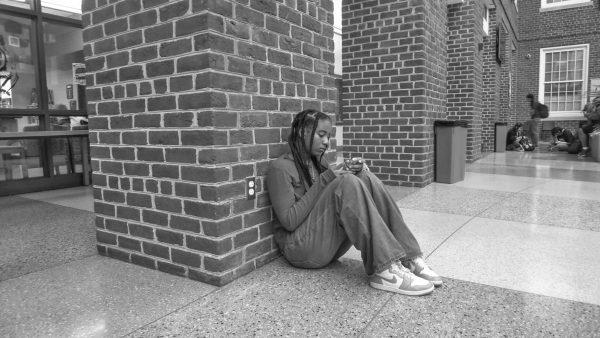At the first senior town hall of the year in August, Principal Sah Brown addressed a packed auditorium. He emphasized Jackson-Reed’s position on a current trend across the DMV: phone bans.
“You can see we aren’t doing that here,” Brown announced. The crowd erupted into applause.
Districts and schools around DC, Maryland, and Virginia have implemented new policies amid concerns that phones negatively impact learning and mental health. The Virginia Department of Education advised that districts restrict phones “from bell to bell,” and Fairfax County is experimenting with pouches that lock phones during class time. Closer to JR, Georgetown Day School recently enacted a school-wide ban.
DCPS however, allows individual schools to regulate phones. Middle schools across the District have banned phones, including JR feeders Alice Deal and Hardy. At JR, teachers can regulate phone usage in their classrooms, but students are expected to use technology responsibly.
“I just wanted the student body to know that we believe, and [students] have shown, that technology can further learning,” Brown said about his announcement. He said that phones are beneficial when used alongside computers mandated for all students and can also serve as a replacement if students forget their computers.
However, according to the National Institute of Health, studies have shown that excessive phone use has been linked to depression and anxiety. Russell Shaw, GDS Head of School, recently implemented a school-wide phone ban, citing national trends of increased mental health issues and an observed uptick among his own students.
“Part of our job as educators is to think about what we can do to create the conditions for students to thrive,” Shaw said in an interview with The Beacon. Starting this fall, GDS students must store their phones in their backpacks or their lockers all day. Shaw said that his goal in implementing the policy was to increase community and promote students’ mental well-being.
“My hope was that high school would be a place where, when kids are walking down the hall, they are not distracted and looking down at their screens, but they’re looking at each other,” he said.
Shaw said that although it is still early, he has noticed a palpable difference in the school with an absence of phones. “The high school feels different,” he said. “There is a lot more physical assembly, which I think is beautiful.”

The new policy has received various reactions. Shaw reported that most parents were supportive, but student responses were mixed.
Some teachers and staff at Jackson-Reed would support a phone ban. Chemistry teacher Jean-Claude Nkongolo has collected all students’ phones in a hanging pouch on his door for six years.
“I think it’s a huge distraction. Students aren’t going to learn if they have their phone with them,” Nkongolo said. “Before I collected phones, it was chaos.”
Chinese teacher Liwen Zhou collects phones from her freshman classes. “I collect the phones so [students] can focus on the work and learning Chinese,” she said. Zhou believes taking phones has been very effective and expressed support for a school-wide ban.
Senior Luke Beronio believes a phone ban won’t eliminate student distractions as easily as teachers hope. “Students are still able to use computers, talk to friends, and will easily find other ways to occupy themselves,” he said.
A concern regarding phone bans is how students should contact their families in case of an emergency. GDS mitigates this by allowing students to carry their phones and use them in the case of an emergency. But, Shaw mentioned that students shouldn’t be on their phones during these situations.
Schools considering bans where students will not have their devices may still have to face these safety concerns.
Brown emphasized that JR’s phone policy will remain unchanged this year, but if DCPS decides to ban phones in the future, JR would need to adjust accordingly.